"The Book of Thel" goes beyond "The Tyger". Blake takes us into the spiritual world of beauty and terror. As a college student, I found Thel's tale compelling. Today, I want others to enjoy it as much as I have.
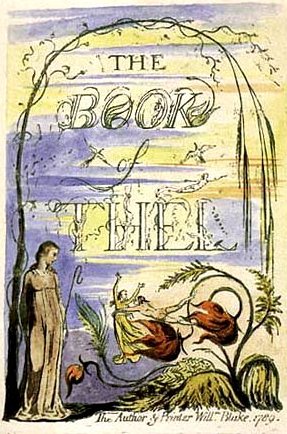 The Story
The Story
Thel is a shepherdess living in an idyllic world ("the vales of Har"). The creatures of this world address her as their sovereign. But she is seeking answers. Her life is insubstantial and seems purposeless.
Thel asks why the flowers must wither and die. She compares her life to transient, formless things, including a rainbow ("watery bow" -- Blake invents many kennings), a parting cloud, reflections in a mirror or in water, the dreams and smiles of babies. the cooing of doves, daytime, and music. Thel hopes that when she dies, she will die comfortably and hear God's voice ("him that walketh in the garden in the evening time" -- the garden of Eden in Genesis 3:8).
A lily of the valley speaks to Thel. In Blake's illustration, the flower has a human form and is bowing to Thel. The flower says God is good even to a little flower. It is protected in the spring, and in the summer when it dies, it will have a happier life in heaven ("flourish in eternal vales"). The lily offers this as an answer to Thel's questions.
Thel blesses the flower for its gifts to other simple things. The meek lamb is comforted by the fragrance and can be nourished and cleansed by the flower. Its pollen helps purify honey. Its perfume scattered on the grass revives the cow after milking and calms wild horses. But Thel says her own life seems as evanescent as the glow of a cloud at sunrise, and that she has not yet found a purpose.
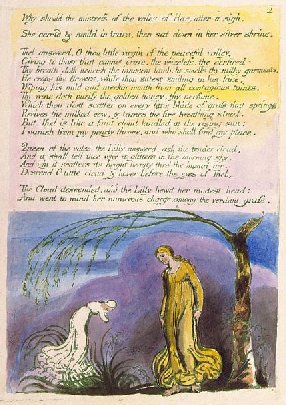 The flower directs Thel to a cloud and goes to attend to its
responsibilities. Thel asks the cloud why it is not troubled by its
mortality. The cloud answers that life is about renewal.
After it has vanished, it will bring life to flowers and humans
and exist
in a far richer form.
The flower directs Thel to a cloud and goes to attend to its
responsibilities. Thel asks the cloud why it is not troubled by its
mortality. The cloud answers that life is about renewal.
After it has vanished, it will bring life to flowers and humans
and exist
in a far richer form.
Thel answers that she does not feel useful, and for this reason she has no joy in her life. She asks whether her life is purposeless, and whether at her death she will merely feed worms.
The cloud replies that feeding worms is a wonderful purpose for life, because all lives are bound together. The cloud summons a worm onto a leaf and flies away to find its partner. In the illustration, the cloud and the worm also have human form, as the lily did. The worm cannot speak, but it can weep, and Thel pities it, imagining that it is a little motherless child.
A piece of clay hears Thel. (In "The Clod and the Pebble", a piece of clay, crushed under the cattle's feet, celebrates the power of unselfish love to bring joy even in the worst circumstances.) The clay moistens and nourishes the worm. It tells Thel that God loves even the clay and made it the nurturer and mother of all things, which is beyond the clay's comprehension. In a third illustration, the clay and worm appear as a woman and child at the feet of the seated Thel.
Thel marvels at this. She knew that God loves worms and will punish anyone who willfully destroys even the littlest life for no reason. But she did not know that God takes care to nurture worms. She says she has found a consolation and an answer for her mortality.
Now the clay asks Thel, "[Are you willing to] enter my house? 'Tis given to thee to enter and to return. Fear nothing." If Thel accepts, she will achieve being and purpose.
The "terrific porter" of the "eternal gates" lifts the "northern bar". Thel enters a new world, full of "couches of the dead" (graves), and "where the fibrous roots of every heart on earth infixes deep its restless twists." It is a terrible place, without the joys of Thel's world. Then Thel comes to her own grave, and sits down beside it. She hears a voice (her own?) enumerating the organs of sense and sexuality, and how each of these must bring suffering.
Thel runs back screaming to the Vales of Har.
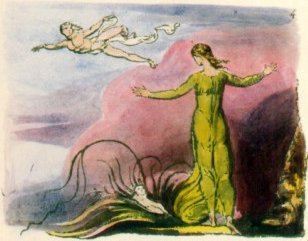 Looking for Clues
Looking for Clues
Blake shared his era's knowledge of the Greek and Roman classics, and was widely read in the literature of the mystical and magical. We know that the Blakes once attended a Swedenborgian church group. The prophetic books are filled with allusions to the arcane doctrines of the spiritual world, including the Jewish account of Adam Kaedmon, the primordial human being.
Thel's name may come from Greek thelos, or "will" (as in "will-power"). "Har and Heva" appear in Tiriel as the ancestors of the human race, and this identifies Thel's world with the garden of Eden, where humankind lived before the Fall.
"Bne Seraphim" is the name of a spirit of Venus in one system of ceremonial magic. In Western astrology, Venus is among other things the planet of romantic love and sexuality. Spirits on the same list of fourteen planetary spirits include Tiriel (intellectual Mercury, the mental tyrant from the poem of the same name) and Zazel (oppressive Saturn, one of Tiriel's slaves). Blake's schooling in unconventional thought and esoteric lore is shown by his citing the spirits of magic.
Thel is a shepherdess, and lambs and sheep for Blake represent innocence and docility. In the "Songs of Innocence and Experience", the lamb contrasts with the tiger as a symbol of innocence. Luvah may represent the sun in Thel's world (later, he's in charge of the moon), and he would become Blake's symbol for love and passion deep in the human mind. Clay is a perennial symbol both for the grave and for the human body.
Adonis was a young man who was loved by the goddess Venus, and perhaps the river of Adona represents budding sexuality. The name may be cognate with Hebrew "Adonai" (G-d), and perhaps the "river of Adona" is one of the rivers that flowed from the biblical Eden, or garden of God.
The biggest hint is a classical allusion -- "the northern gate". The "cave of the nymphs" in the Odyssey (Book 13) has two gates, the north for mortals and the south for the gods. Porphyry describes this as an allegory of the transmigration of human spirits. Pre-existing souls enter the material world by the northern gate of desire, and after experiencing life return along the southern path of liberation. The nymphs work at looms weaving the phenomenal world. Later, Blake would write about the family of Los (the spirit of creativity) weaving bodies for these souls.
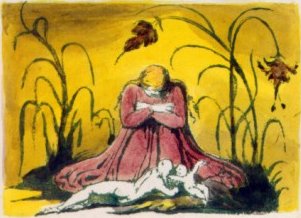 Our Own Innocence and Experience
Our Own Innocence and Experience
One of Blake's best-known themes is the contrast between innocence and experience. A child begins life protected, trusting that he/she is surrounded by goodness. (Shakespeare uses the expression for a simple-minded, guileless person in "The Winter's Tale" V.ii.) Experience brings awareness that everything is not pleasant or right. Blake contrasted these themes in paired poems. God made a sweet lamb, and God made a terrible tiger. Little chimney sweeps sing thankfully in church, and an adult recognizes how abominably these child-slaves are being treated. Children dance in a meadow, and their caregiver remembers how little she knew as a child and how much time she wasted.
Blake wrote, "Without contraries there is no progression." Blake's hope was that life could be redeemed by love and art, to a state of "organized innocence", goodness without ignorance. A child hearing Blake's poetry first laughs (innocence), then weeps (experience), then weeps for joy (organized innocence.)
The lily, the cloud, and the clay all serve others, and teach that life is indeed worth living. The lily assures Thel of a happy afterlife. The cloud teaches Thel that all life is wonderfully interconnected. The clay promises that Thel will be nurtured, and offers her the opportunity to have experience. Thel realizes this is the answer that she was seeking, even though she does not (yet?) act upon it.
We have all known teenage ennui. "Who am I?" "I'm nobody." "My life has no purpose." "What does this all mean?" "Maybe I'd be better off dead." Yet we've seen the same people refuse to take the risks and face the challenges that would bring meaning to their lives.
Perhaps Blake is saying, on one level, "This is easy to understand. It is hard really to grasp all the challenges of life. Be patient with such people. Perhaps they can remain innocent."
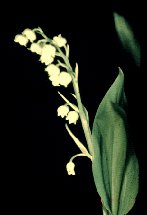 Life Before Birth
Life Before Birth
-
Every cradle asks us "Whence?" and every coffin "Whither?"
- -- Robert Ingersoll, "At a Child's Grave"
Wordsworth saw in the outlook of an innocent child evidence that "our birth is but a sleep and a forgetting" (Intimations of Immortality). He suggests in the poem that the world appears wonderful to a child because the child has only recently left previous existence in a celestial realm to become incarnate in this one. Later on, Wordsworth admitted that this had scandalized "some good and pious persons" and denied that he had "meant to inculcate such a belief." He continues:
I was told in college that Wordsworth did not really believe in pre-existence, but I decided that he probably did, or at least thought it likely. More recently, Robert B. Zimmer, a student of anthroposophy, has argued in "Clairvoyant Wordsworth" that Wordsworth actually did remember his previous existence. I enjoyed his book.It is far too shadowy a notion to be recommended to faith, as more than an element in our instincts of immortality. But let us bear in mind that, though the idea is not advanced in revelation, there is nothing there to contradict it, and the fall of Man presents an analogy in its favor. Accordingly, a pre-existent state has entered into the popular creeds of many nations; and, among all persons acquainted with classic literature, is known as an ingredient in Platonic philosophy... I took hold of the notion of pre-existence as having sufficient foundation in humanity for authorising me to make for my purpose the best use of it I could as a poet.
The Cabalistic ideas about previous existence are given a modern setting in Isaac Bashevis Singer's famous short story, "Yachid and Yechida." For some people, a pre-existent soul's decision to enter our world was a temporary death on the spiritual plane. Entry into the grave there is entry to the body here.
For Blake, human existence as we know it was about growing spiritually. The material world was created by divine mercy, and Blake actually describes it in terms of the creation of the sense organs. Without love or imagination, the world of matter, time, and space is "Ulro", a meaningless exercise in futility. But by the wonderful power that inspires poetry and creativity, it could be transformed into "Generation", an opportunity to grow spiritually until the final time of transformation. Blake opposed his era's new materialistic philosophies. His Christianity emphasized the power of forgiveness and love and expected an apocalypse in which the nature of the world and human perception itself would be radically transformed. In "The Little Black Boy", Blake explains that we are born on earth to learn "to bear the beams of love." Life is a challenge and an opportunity for learning, and while sometimes terrible, it is not a punishment or ultimately an evil.
Blake wrote at some length in "Milton" about the work of the blacksmith Los's family in providing bodies for spirits destined to become human. Here the souls enter and leave the bodies by gates to the north and south of an allegorical Britain. The process is terrifying to them as it was to Thel.
There are Two Gates thro which all Souls descend. One Southbound
From Dover Cliff to Lizard Point, the other toward the North
Caithness and rocky Durness, Pentland & John Groats House.
The Souls descending to the Body wail on the right hand
of Los, and those deliver'd from the Body, on the left hand...
You may want to study more about what people have believed about life before birth, both in the past and today. There is nothing in Blake to suggest that he believed life's burdens were a punishment for previously-committed sins. (Whatever you may think of this idea, it is still used in some cultures to make people accept their bad circumstances.) Instead, for Blake, the world is a wonderful place where we can love and grow in the service of others. And if we are to believe the story of Thel, entering it is a free choice.
The Blake's Personal Life?
When I first read the poem, I wondered whether "The Book of Thel" was written after the Blakes lost an unborn child. Later, I learned Northrop Frye and others had had the same idea. Janet Warner's brilliant historical novel Other Sorrows Other Joys tells a story that may be true.
Blake takes a deep breath and watches Mrs. Goodhouse, the midwife, wrap the little body in a white cloth, and lay it beside Kate, who has become extremely quiet. Blake puts out his hand and touches the cheek of his tiny dead daughter, who -- he suddenly knew -- had chosen to be forever innocent. While Kate sleeps, he picks up his pencil and begins to write:
O life of this our spring! Why fades the lotus of the water?
Why fade these children of the spring? Born but to smile and fall...
The Blakes could take comfort in believing that their unborn child, like Thel, could still live forever without suffering.
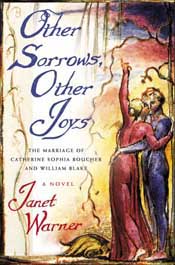 More for Students
More for Students
Thel's motto is cryptic. It seems to ask whether wisdom and love (which Thel seeks) are to be achieved by remaining in the remote spiritual realms (the eagle) or by becoming incarnate (the mole, the rod and bowl). The eagle has keen sight but is remote; the mole is blind but dwells in the earth. The "golden bowl" is familiar from Ecclesiastes, where it is paired with a silver cord. Both must be emblems of incarnation, because they are destroyed at physical death. Thel's question is subtle. For some reason, embodiment is essential to full experience, but it is also limiting. You can have fun exploring this.
You might enjoy finding other kennings in Blake. Sleep is "pleasant death", a character's head is his "golden floor", semen is "pearly dew", a marigold's flower is its "golden shrine", and sheep are "mild demons of the hills". They were fashionable during the 18th century -- in Thomas Gray's "Ode on the Death of a Favourite Cat", the goldfish are "the genii of the stream." For those who go on to study the larger prophetic books, Thel's idyllic world seems to be Beulah, and she is invited to pass into Ulro and then Generation.
Students of English literature will remember Hamlet, Hotspur, Mercutio, and many others who refer to the body's ultimately being worm food. Hamlet saw this as showing of life's final tragedy. For Thel's guides, it's a joy and a reassurance that the world is ultimately benevolent. (As a pathologist, worms and maggots have a special, though more mundane, meaning for me.)
Blake was interested in contemporary science, though he opposed scientific reductionism as a philosophy. His poem "Milton" suggests that he had looked through both telescopes and microscopes, and believed in what they showed him. He was impressed enough by red blood cells (which he called the "red globules of blood") to mention them in several places. He said their size distinguished two types of visionary spaces, and while his subsequent discussion of space-vortices that guide visionary travellers is difficult, the red round object he is using in a self-portrait may be a glowing RBC.
Tolkien's story "Roverandom" was written for his son, who lost a toy dog at the beach. It explains how the best-loved toys become real. Whether or not you believe that Blake wrote this poem for his wife after a miscarriage, you may enjoy finding other works of fiction that give comfort after a loss. Ask your instructor.
You will find other ideas about "Thel" online. Some writers emphasize Thel's refusal as a rejection of sexuality. You'll have to decide about this yourself. This is certainly a concern elsewhere in Blake's works -- Blake thought this is something that people, especially young people, should not be denied or deny themselves. The "little curtain of flesh" seems to be the hymen, and this may also be the "tender curb upon the youthful burning boy." Perhaps accepting sexuality and accepting incarnation are all bound up together. Some readers have found Thel to be selfish, and wondered whether the other beings' addressing her as "queen" is sarcasm.
Blake's visionary world was based on his own "visions" and "voices". I have argued elsewhere that these match those of schizophrenia, a process that a clinician can diagnose and a neuropathologist can describe. Blake could distinguish what he saw and heard ("my twofold vision") from ordinary reality ("single vision"). Although he wrote privately about how the voices did sometimes trouble him, we know of only a few times when he seemed delusional. Today, there is increased recognition of people like Blake, and that such experiences can even have positive value. It would seem to me (and to many others nowadays) to be a mistake to characterize Blake as "sick", any more than a pathologist would call freckles or a favorite birthmark a "disease". Perhaps as Karl Jaspers wrote, all we know is that a new world has come into existence, for us to try to understand and appreciate.
Finishing Up
Blake loved Dante, who wrote about his own long poem as having allegorical meanings on four different levels. Just as Dante describes both the afterlife and this world in the same images, so "The Book of Thel" seems to describe both a spirit's pre-existence and a human's own coming to terms with life and what it must bring.
My college years were turbulent, as I forced myself to gain experience despite being poorly prepared socially and very afraid. A lot happened, and I made some bad mistakes. But I often returned, in my thoughts, to the assurance that was given to Thel. You don't need to run away. Whatever happens to you will ultimately empower you to live for others.
If I am better today for what I dared to experience then, I owe much to the genius of William Blake.

Blake's Milton -- also by Ed
You can E-mail me
at efriedlander@wmcarey.edu.
Brown University,
Department of English -- my home base, 1969-1973.
Norm Bertels,
my college friend to whom I dedicated my honors thesis. Link is now down.
Links
Blake Archive
The Book of Thel -- with Richard Dover's commentary
The Book of Thel -- all engravings on one page
The Lamentations of Thel -- opera
Cave of the Nymphs -- Porphyry
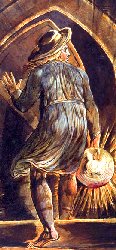

 I'm Ed.
You can visit me at my own page
and
follow the links from there to more on medicine and the humanities.
I'm Ed.
You can visit me at my own page
and
follow the links from there to more on medicine and the humanities.
Fellow English majors -- Okay, okay, I know the commas are "supposed" to go inside the
quotation marks and parentheses. This became standard to protect fragile bits of movable type. My practice lets me know I'm the one who's
typed a particular document.
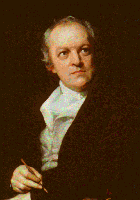 Enjoying "The Book of Thel" by William Blake
Enjoying "The Book of Thel" by William Blake
